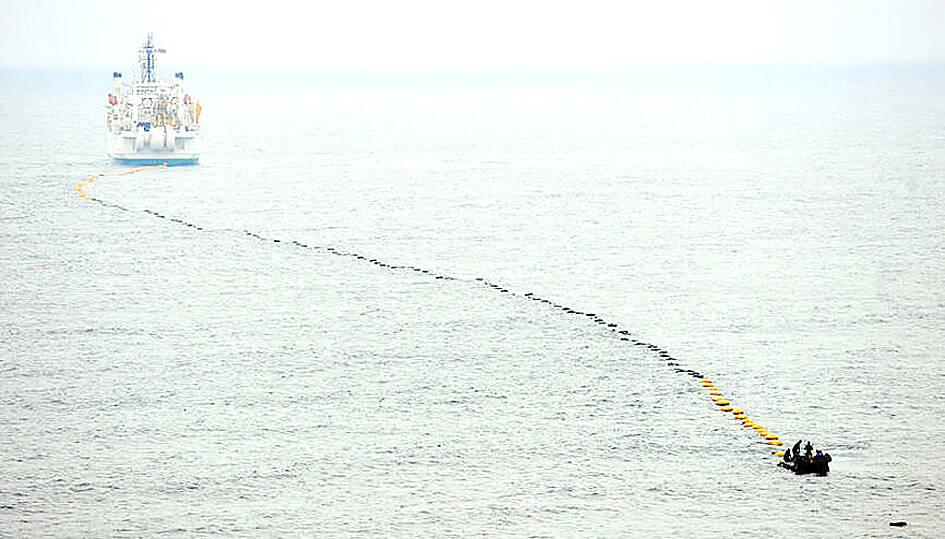Two undersea cables connecting Lienchiang County (Matsu) with Taiwan proper were disrupted due to “natural deterioration” and could be repaired by next month, the Ministry of Digital Affairs said today.
The No. 3 Taiwan-Matsu cable was obstructed on Wednesday last week, and the No. 2 Taiwan-Matsu cable was disrupted this morning at 5am, Chunghwa Telecom said today.
The Ministry of Digital Affairs held a news conference at 11am to explain the situation.

Photo: Taipei Times
Chunghwa Telecom activated microwave communications within one hour of the second cable’s disruption at the ministry’s request, Deputy Minister of Digital Affairs Chiueh Her-ming (闕河鳴) said.
Communications should not be impacted, as the current microwave bandwidth is 12.6Gbps, which is higher than Matsu’s daily peak bandwidth of 9.5Gbps, Chiueh said.
Bandwidth would be prioritized for essential public services such as government agencies, banks and hospitals to ensure they are not disrupted, he said.
During the Lunar New Year holiday, people could still withdraw money from ATMs and online transactions would remain uninterrupted, he added.
The ministry has nine asynchronous satellite devices in Matsu that would serve as backup microwave channels for the Lienchiang County Government, Chiueh said.
No “suspicious” ships were detected when the cables went offline, he said.
Natural deterioration was the likely cause, but cases of ships damaging Taiwan's sea cables have risen in recent years, he added.
So far this year, Taiwan has reported four cases of disruptions in undersea cables, compared with only three both last year and in 2023, Chiueh said.
In 2023, the two undersea cables connecting Lienchiang were cut, disconnecting the Internet.
Authorities said two Chinese vessels caused the disruption, but that there was no evidence that Beijing deliberately tampered with the cables.
Taiwan has since worked to boost its communication resilience for emergencies including a conflict with China, such as a trial program to use low-Earth orbit satellites for remote areas including Lienchiang.

INVESTIGATION: The case is the latest instance of a DPP figure being implicated in an espionage network accused of allegedly leaking information to Chinese intelligence Democratic Progressive Party (DPP) member Ho Jen-chieh (何仁傑) was detained and held incommunicado yesterday on suspicion of spying for China during his tenure as assistant to then-minister of foreign affairs Joseph Wu (吳釗燮). The Taipei District Prosecutors’ Office said Ho was implicated during its investigation into alleged spying activities by former Presidential Office consultant Wu Shang-yu (吳尚雨). Prosecutors said there is reason to believe Ho breached the National Security Act (國家安全法) by leaking classified Ministry of Foreign Affairs information to Chinese intelligence. Following interrogation, prosecutors petitioned the Taipei District Court to detain Ho, citing concerns over potential collusion or tampering of evidence. The

‘FORM OF PROTEST’: The German Institute Taipei said it was ‘shocked’ to see Nazi symbolism used in connection with political aims as it condemned the incident Sung Chien-liang (宋建樑), who led efforts to recall Democratic Progressive Party (DPP) Legislator Lee Kun-cheng (李坤城), was released on bail of NT$80,000 yesterday amid an outcry over a Nazi armband he wore to questioning the night before. Sung arrived at the New Taipei City District Prosecutors’ Office for questioning in a recall petition forgery case on Tuesday night wearing a red armband bearing a swastika, carrying a copy of Adolf Hitler’s Mein Kampf and giving a Nazi salute. Sung left the building at 1:15am without the armband and apparently covering the book with a coat. This is a serious international scandal and Chinese

Seventy percent of middle and elementary schools now conduct English classes entirely in English, the Ministry of Education said, as it encourages schools nationwide to adopt this practice Minister of Education (MOE) Cheng Ying-yao (鄭英耀) is scheduled to present a report on the government’s bilingual education policy to the Legislative Yuan’s Education and Culture Committee today. The report would outline strategies aimed at expanding access to education, reducing regional disparities and improving talent cultivation. Implementation of bilingual education policies has varied across local governments, occasionally drawing public criticism. For example, some schools have required teachers of non-English subjects to pass English proficiency

TRADE: The premier pledged safeguards on ‘Made in Taiwan’ labeling, anti-dumping measures and stricter export controls to strengthen its position in trade talks Products labeled “made in Taiwan” must be genuinely made in Taiwan, Premier Cho Jung-tai (卓榮泰) said yesterday, vowing to enforce strict safeguards against “origin laundering” and initiate anti-dumping investigations to prevent China dumping its products in Taiwan. Cho made the remarks in a discussion session with representatives from industries in Kaohsiung. In response to the US government’s recent announcement of “reciprocal” tariffs on its trading partners, President William Lai (賴清德) and Cho last week began a series of consultations with industry leaders nationwide to gather feedback and address concerns. Taiwanese and US officials held a videoconference on Friday evening to discuss the